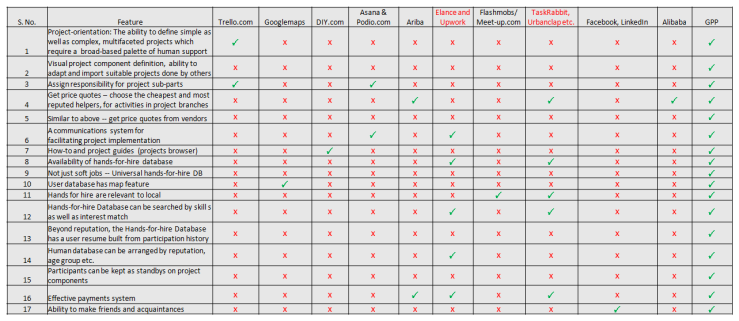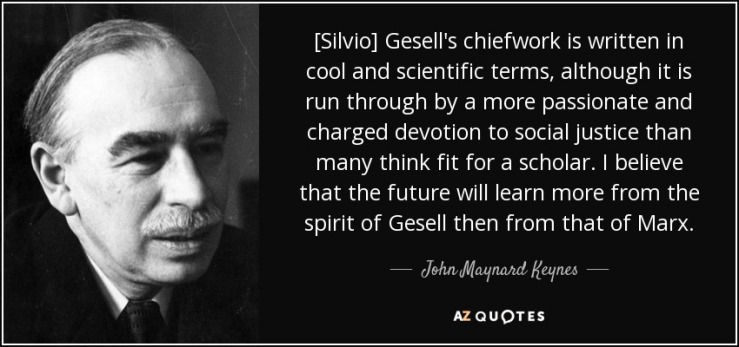As that Nike ad said, “Just do it”. DIY, Do it yourself is indeed a fine way to do, but some projects are just too difficult for 1 guy to handle. Thus its logical extension @ Beaverteams: DIO, “Do it Ourselves”.
Of collaborative software — asana, podio, and the various similar platforms — nearly all of them cater to corporations, letting colleagues cooperate. Beaverteams in contrast is meant mostly for individuals, who have no colleagues, who may want custom, task-oriented sets of “colleagues”.
Nearly all freelancing or collaborative web portals focus on “soft” tasks: coding, document editing, SEO services, and the like. At the other extreme we find handyman-hiring websites (that obviously do not concern themselves with collaboration). Nowhere do we find a task type (“soft” or “hard”: piping, building, guitaring)-agnostic solution designed for a society of equals.
Today, businessmen talk about nearly everything — except the most important ‘objects’ of all, the most complex “objects” on earth, i.e., humans — who are, systemically or otherwise, unduly neglected.
Beaverteams is more than just a human map with information about human beings and what they can do for you, what skills do they have, what they are interested in; it is a human marketplace.
Due to the lack of a human marketplace, we see a lot of real world examples of operations performed sub-optimally, or of projects that should be undertaken, but are not undertaken at all.
As Nilay Bhatnagar says, a human marketplace will beget disruption across all industries; what Uber has done for taxis and airbnb for hotels. A new, individual-centric way of doing things that enables individuals to collaborate — a new way which, when combined with modern individual-oriented technologies (PC drafting and 3D printing etc.), promises to have many disruptive effects on the current way of doing things (employment). And is it not required?
As Nilay says, “every industry needs to be completely and utterly disrupted. They are relics of the past”.
Big companies, like the inefficient “dinosaurs” of myth, might go extinct despite their two big advantages:
- Consumer herdism (a phenomenon related to but the opposite of laggardism… a good example is the case of Apple … how the faithful always buy new iphones is compared to this!).
- b2b or b2g cartelisation, where g stands for, as Dr. Melamade calls it, “govern-mental illness”.
With CEOs often making more than a hundred times than “wage slaves”, big companies are simply too inefficient.
Also in favor of the new individual-centric way of doing things is the information age. For example, customs like wars are out of fashion. And psychoanalytics-based advertisements fail to convince people any longer, especially the youth. To take an example:- in old times, children bought useless items on the “basis” of ads with scantily clad females; but now they have porn, and, sex is no longer a novelty, thus the youth can be subliminally influenced no longer.
Thus Beaverteams is a collaboration-enabling platform with end-to-end support for social leaders who have (or have borrowed) ideas worth supporting, a disruptive portal that might replace corporations.
But wait… only corporations can get things done… right?
As Godin shows in his book Tribes, today, leaders are enough; companies are not really necessary for getting things done. All the leader needs is a General Purpose Platform for project execution.
The new Beaverteams way of doing things compared to the old way:
Weber’s theory of bureaucracy in successful corporations or pseudo-corporations calls for 4 essential features:
|
| 1. Administrative Class |
| 2. Hierarchy |
| 3. Division of Work |
| 4. Formal selection of right employees |
Point 1: In Beaverteams, all the administration is done by the leader, the founder of the project, who is supported by the expertise of chosen advisors. As against the old way: An expensive, lazy administrative class; top execs earning up to 1000 times more than blue collar workers. And it used to be as if you’re married to one boss throughout your career; no exposure, little learning.
Point 2: Various project owners and advisors guide the doers as they complete a variety of projects.
Point 3: IT-enabled division of labor and definition of responsibilities is enabled by the Beaverteams GPP, a model that doesn’t suffer from Pareto’s law (20% of the people do 80% of the work)
Point 4: In Beaverteams, formal selection is enabled by detailed specification of helpers (project history, reputation etc.). And what about modern corporations? Have you read The death of the expert?
We briefly discussed how the Beaverteams GPP differs from the other, distantly “similar” solutions.
Let’s complete that discussion to see how unique Beaverteams really is (zoom out the page if needed):

Examples of Use Cases for the Beaverteams GPP:
Newbies: Someone new in town, who just wants to check out the human map to know who’s around
Children: Learn, define, and implement projects with like-minded friends or students and teachers
Professors: Define research areas, describe projects in detail, rope in interested students, act as consultants
Companies: Get things done at a fraction of the typical cost
Musicians and other collaborative artists: Find other skilled musicians, find support for film making etc.
Sportsmen: Organize matches, assign responsibilities (e.g.: who’ll bring drinks, who’ll hire ground, floodlights etc.)
Event planners: Organize events and invite many people
NGOs: Rally people for good causes (like planting a thousand trees this weekend)
Experts, doers, and vendors: Sell your knowledge, manpower, and wares at fair free market rates
Businessmen seeking temporary business partners (doers, advisors, interns etc.) at cheap rates to grow their business
Strangers and Lonely hearts: Find people using the human map (arrangements are in place to prevent stalking)
People who live in communes and need a virtual currency to regulate their internal economic activities
People of PIGS countries (and places like Venezuela)
The underemployed & Unemployed: Can use the internal currency system to transact goods and services.
What… egalitarian internal currency system?
Yes!
Beaverteams give the choice for users to use either local currency (government fiat) or an egalitarian internal currency, the GP, or Gesellian Pound (inspired by the theories of Silvio Gesell).

I’m not saying, “Use the GP because it’s egalitarian” — but I surely say don’t interrupt the experiment — let the people decide which mode of payment to use, which is better. If more people use local (fiat) currency, then so be it, it must be better on the whole. If they use more GPs (because of the many advantages the GP brings to the table), so be it, GPs must be better on the whole.
Well, this economic system is much to talk of — but you don’t need an economics degree to read it:
GP-write-up
The GP system may not be perfect as of now, but that should not discourage you from joining and trying it out. Any problems will be rectified through user feedback and further development of the analysis. At least the GP monetary infrastructure provides a start, those who are ill-treated by capitalism (workers, farmers, and whoever does the actual work and is duly insulted by the system) — should lead the way in adopting this new global currency, especially given that they won’t lose anything due to the provision of a safety net (see point 12 in above PDF).
The important thing to take away is that every user who registers in the Beaverteams database, gets free money — 200 GPs — to kick-start his economic activities! So grab your free account now…
As for free land, which is another requirement of a Gesellian order and can help kick-start local GP-based economies, it’s not so easy for me to arrange, but surely you can find some land considering this. Wrestle the government, in case it tries to restrict you, for your right to a bit of land.
If you think on it, you’ll realize that Beaverteams works best when there are (a lot of) people nearby. For a start, these people could be your friends living nearby… So do tell your friends to join!


